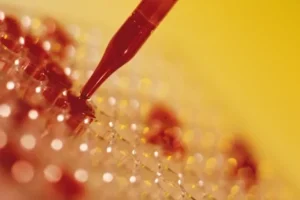
People have two copies of each gene, one inherited from their mother and the other from their father. Autosomal recessive disorders develop only when two mutated copies of a certain gene were inherited.
Most autosomal recessive disorders are severe and often fatal. They usually manifest during infancy. Examples of disorders with an autosomal recessive inheritance pattern are cystic fibrosis, Tay-Sachs disease, certain muscular atrophy diseases, and more.
What happens when only one copy of the gene is mutated?
In mutations that cause autosomal recessive diseases, when a person has only one mutated copy of the relevant gene, they will not develop the disease. However, they will become a carrier of the gene mutation and can therefore pass it down to their children. In each pregnancy, there is a fifty percent chance of passing down the mutation to their child.
If the second parent is also a carrier of the gene mutation, they too can pass down the mutation to their children. Accordingly, two carriers of an autosomal recessive gene mutation have a 25% chance of having a child with this disorder in each pregnancy.
Probability of having a child with an autosomal recessive disorder when another child in the family has the disease
When a child is born with an autosomal recessive disorder, it can be concluded that both their parents are carriers of the mutation. Therefore, with each subsequent pregnancy, the chances of having another child with this disease are 25%.
Other family members are at an increased risk for being carriers, but their chances of having a child with the disorder are very low (in most cases, the chances are less than one percent) since their partners will most likely not be carriers.
For this reason, people with two mutated copies of the relevant gene, who have developed the disease, are at a relatively low risk for having a child with the same disorder, although they will pass on the relevant gene mutation to their child.
What tests are recommended to families with autosomal recessive disorders?
In families where at least one member has an autosomal recessive disease, the relevant mutation causing this condition can usually be identified. After the mutation is detected, parents can undergo genetic counselling during subsequent pregnancies. In addition, detection of the gene mutation allows testing other family members and thus diagnosing carriers. After these carriers are found, they may wish to encourage their partners to also undergo carrier screening to decrease the risk of having children with this disorder.
Carrier screening in general population
In the past, it was impossible to identify carriers of autosomal recessive gene mutations, since they appeared healthy or at least did not show symptoms directly related to the disorder. Today there are various tools that allow performing screening tests in general population, or in populations at risk, to detect carriers of genetic diseases with an autosomal recessive inheritance pattern.
For example, if a couple of Ashkenazi Jewish descent are planning to have children, they can undergo carrier screening for certain genetic diseases even before conception. These tests are first performed on one of the partners and if they are found to be carriers, the other partner is also tested. If the first partner is found to not be a carrier of the relevant mutation, there is no point in continuing testing the other partner since their child will only develop the disease if they inherit the gene mutation from both their parents.
Why must two copies of the gene be mutated for the disease to develop?
The genes relevant to mutations with an autosomal recessive inheritance pattern are coded to produce various enzymes. When only one copy of this gene is mutated, the healthy copy can produce enough enzymes for the disease to not develop. However, two mutated copies prevent the normal enzyme production necessary for the body’s healthy function. This abnormal enzyme activity leads to various health impairments associated with autosomal recessive disorders.

